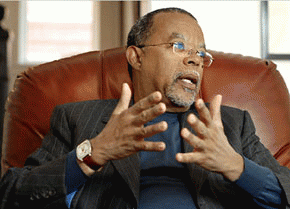In recent days an enormous discussion has taken form within many American quarters, as Dr. Henry Louis Gates has once again weighed in on the question of reparations for African Americans.
The Harvard Professor's most recent article entitled, "Ending the Slavery Blame Game", in which Gates produces information regarding those African nations which actively aided European slave merchants during the Trans-Atlantic Slave Trade has functioned to not only broaden the lens in which this tragic event may be viewed, but has also served to explain the complexity in which culpability may be assessed.
Gates, within the article, makes mention of several Western and Central African populations, including but not limited to, the Akan of the Asante kingdom in what is now Ghana and the Kongo of what is presently Congo as those groups that profited from the selling of Africans to European forces. The scholar even makes mention of the revered 17th Century Queen Njinga, ruler of the Mbundu, as he reveals her duplicitous station as opponent and business partner to Portuguese slavers.
Professor Gates' excursions into the history of the African holocaust and subsequent assessment as to those parties who may have been responsible therein are to be commended. However, the scholar's suggestions that the fact numerous African nations were considerably involved in the development of this horrific event, presents an obstacle regarding the payment of funds to the descendants of the victims may be inaccurate. Such a determination may emerge, as the professor's proposition lacks some measure of historical perspective.
In Nazi Germany's unfortunate efforts to enact genocide on its Jewish citizens, considerable hardships were endured by this population. However, once this egregious affront to humanity was brought to an end, the prevailing world powers demonstrated little difficulty in procuring capital for the effected group. This reality prevailed in light of the fact other nations supported and contributed to the creation of this unspeakable segment of Germany's history.
Aid to the Jewish world community surfaced to the extent that even a population - The Palestinians -that had nothing to do with the lamentable plight experienced by these European peoples, was displaced from its land so as to make available this resource to those surviving this holocaust; thus the creation of Israel.
In the face of this historical event, Dr. Gates' statements suggesting payment to African Americans for centuries of forced labor experienced by their ancestors may be compromised by virtue of the fact multitudinous nations partook in the heinous institution which caused the circumstance to exist, is without merit.
The United States government, as reflected by its past and current financial and militaristic support of Israel - similar to that of its aid to the citizens of Bosnia - has an established history of providing considerable resources to many of those groups that have experienced the profound sting of gross inhumane treatment. Such has been the case; irrespective of whether the United States has been responsible for the suffering of these populations or not.
Additionally the professor's thoughts, via this article, fail to address what ought to be the fundamental question regarding the reparations debate.
The primary question with respect to reparations for African Americans hinges not on who is responsible for these crimes against humanity, but rather what measures must be imposed by this people to bring this desired objective to fruition.
At the very least the United States along with several European and African nations are culpable for the legacy of slavery within this nation. If additional entities can be proven to have participated in the Trans-Atlantic Slave trade, they too, must be held accountable, and made to provide restitution to the descendants of those effected parties.
The failure to pose this question on behalf of those scholars, who engage the subject of reparations, bespeaks a desire to avoid any serious discussion in regard to the matter.
(Note: You can view every article as one long page if you sign up as an Advocate Member, or higher).





